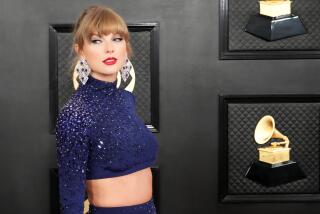Female Guitarists Fretting Smaller Stuff
- Share via
CHICAGO — Back in high school, the only people Jean Kahler knew who played guitar were guys. They weren’t very good, she says, but they were their own little club.
Then, sometime in college, “there started to be a cool girlie guitar thing,” says Kahler, a 23-year-old Chicagoan who started guitar lessons two years ago.
Now, an instrument once associated with such male rock pioneers as Jimi Hendrix, Eric Clapton and Carlos Santana is getting lots of interest from young women and girls. And guitar makers are taking note.
“The tide is starting to turn,” says Tish Ciravolo, owner and designer of Daisy Rock Guitars, a line of smaller, colorful daisy- and heart-shaped electric models made with females in mind.
Ovation Guitars, meanwhile, has begun marketing a line of Melissa Etheridge instruments, and Gibson Guitars has a Sheryl Crow model.
Ciravolo introduced her guitar line last year.
She was among a handful of women playing the bass professionally in Los Angeles in the early 1980s, but gender lines in the music business shifted noticeably in the ‘90s with a wave of new singer-songwriters such as Ani DiFranco and Jewel. Then came the Lilith Fair, an all-women’s music tour led by Canadian songstress Sarah McLachlan.
These days, images of women with guitars are commonplace, from India.Arie, who played and sang at this year’s Grammy Awards, to up-and-comer Michelle Branch.
The trend is inspiring everyday women to join the ranks.
Laura Snyder bought her first electric guitar last fall--a move she attributes to her ill-fated attempts to date “bad-boy rocker types.”
“After the last one dumped me, I decided, if you can’t date ‘em, join ‘em,” says Snyder, 23, from State College, Pa., who named her guitar “Betty.”
Michelle Clark, 12, from Monrovia, also took up the guitar last fall. She plays with fellow sixth-graders--six other girls and two boys--and prefers the instrument to the violin.
“For one thing, you can sing while playing the guitar,” she says, noting that she most often jams with the girls in her class.
Stories like that are catching the interest of guitar manufacturers. Taylor Guitars has begun donating smaller “baby” versions of its instruments to elementary school classrooms.
C.F. Martin & Co. carries a line of smaller “Women in Music” guitars meant to be easier for a young girl or petite woman to handle.
“The car industry has recognized that, ‘Gee, women buy cars, too,’” says Christian F. Martin IV, chairman and CEO of the Nazareth, Pa.-based company. “The guitar industry needs to do the same thing.”
He says women account for at least 15% of the company’s sales--well above the industry average of about 5%.
Barry Horowitz, vice president of purchasing at Sam Ash Music Corp., says guitar sales are increasing generally, in part because the cost of an instrument is dropping. Sam Ash doesn’t track who buys its guitars, but Horowitz thinks “women are more involved than they used to be.”
Some women say buying a guitar would be easier if stores added a few female salesclerks, offered classes and made it simpler to ask questions.
Kahler, who plays acoustic guitar, is one of many who says she still feels “totally intimidated” walking into music stores. She’s most comfortable at Chicago’s Oldtown School of Folk Music, where she’s taking a guitar class featuring tunes by female artists.
Mariela Azcuy says she also felt out of place the first time she walked into a small guitar store in Manhattan’s West Village. But Azcuy says the salesman put her at ease when he let her try out any number of electric guitars in a soundproof room.
A few weeks ago, she walked out of the store with a baby-blue Fender Stratocaster and an amplifier.
Now she jams regularly with a group of budding female musicians, ages 24 to 27.
“I don’t think there’s anything that says that only [men] genetically can be rock stars,” says Azcuy, 25, who’s a magazine promoter by day.
More to Read
The biggest entertainment stories
Get our big stories about Hollywood, film, television, music, arts, culture and more right in your inbox as soon as they publish.
You may occasionally receive promotional content from the Los Angeles Times.










